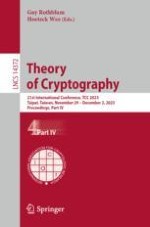2023 | OriginalPaper | Buchkapitel
Public-Key Encryption with Quantum Keys
verfasst von : Khashayar Barooti, Alex B. Grilo, Loïs Huguenin-Dumittan, Giulio Malavolta, Or Sattath, Quoc-Huy Vu, Michael Walter
Erschienen in: Theory of Cryptography
Verlag: Springer Nature Switzerland
Aktivieren Sie unsere intelligente Suche, um passende Fachinhalte oder Patente zu finden.
Wählen Sie Textabschnitte aus um mit Künstlicher Intelligenz passenden Patente zu finden. powered by
Markieren Sie Textabschnitte, um KI-gestützt weitere passende Inhalte zu finden. powered by

 .
.